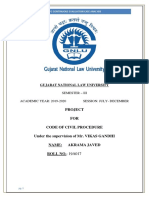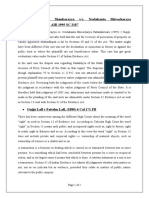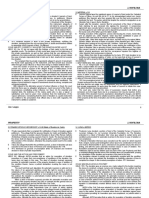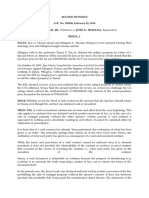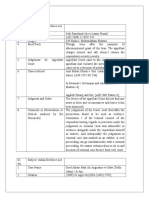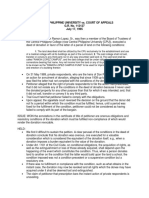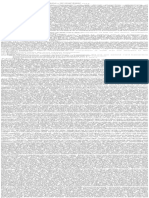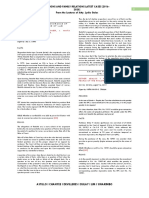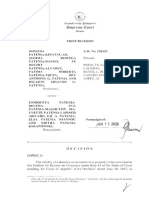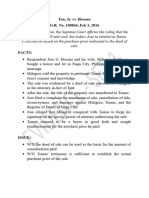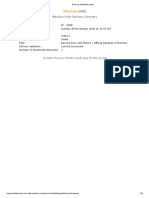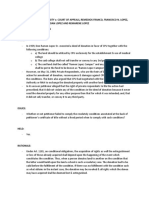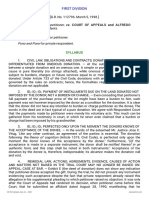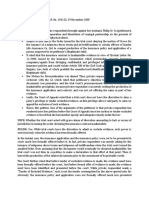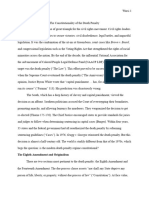Case Name: Mahboob Sahab vs. Syed Ismail & Ors.
Date of Judgment: 23/03/1995
Court: Supreme Court of India
Equivalent citations: 1995 AIR 1205, 1995 SCC (3) 693
Judges: K. Ramaswamy (Author), HANSARIA B.L. (J)
Facts:
Syed Ismail and Ibrahim filed a suit against their parents and the appellant (Mahboob Sahab) for
possession of certain lands and mesne profits.
They claimed that their father had executed a gift deed bequeathing a portion of the land to
them and that their mother orally gifted her share to Syed Ismail at the time of his marriage.
The appellant contested, stating that the father had entered into an agreement of sale to
discharge debts, and the sales were valid.
Issues:
Validity of the alleged gift deed and oral gift.
Whether the decree in a previous suit (OS No.3/1/1951) operated as res judicata.
Decision:
The trial court decreed the suit in favor of the respondents.
The appellate court reversed the decree, stating that the alleged gifts were not proved, and the
father had the right to alienate the property.
The High Court, without disturbing the findings on merits, reversed the appellate decree solely
on the ground that the decree in OS No.3/1/1951 operated as res judicata.
Reasoning:
The court found that the alleged gifts were not proved. No evidence was presented for the
essential elements of a valid gift, such as declaration, acceptance, and delivery of possession.
The High Court erroneously applied the doctrine of res judicata, as there was no conflict of
interest between the defendants in the previous suit, and the validity of the gifts was not a
necessary issue for the relief sought in that case.
The court highlighted the relevance of Section 44 of the Evidence Act, which allows a party to
show that a judgment obtained was by fraud or collusion.
Conclusion:
The Supreme Court allowed the appeal, setting aside the judgment and decree of the High
Court. The appellate court's decision was restored, resulting in the dismissal of the suit filed by
the respondents. Costs were awarded to the appellant.
�This summary provides an overview of the case's facts, issues, decision, and reasoning. Legal principles
such as the validity of gifts, res judicata, and the relevance of Section 44 of the Evidence Act were
considered in reaching the judgment.
more
ChatGPT
Certainly, here is a continuation with more details on the case:
Additional Details:
1. Gift Deed and Oral Gift:
The respondents claimed that their father had executed a gift deed in their favor, and
their mother had orally gifted her share to Syed Ismail.
The appellant contested these claims, arguing that the father had entered into an
agreement of sale to discharge debts, and the sales were valid.
The court found that the essential elements of a valid gift, including declaration,
acceptance, and delivery of possession, were not proven. No evidence was presented to
establish these crucial components.
2. Previous Suit (OS No.3/1/1951):
The respondents relied on the decree in a previous suit, OS No.3/1/1951, as res judicata.
The trial court had held that this decree did not operate as res judicata but decreed the
suit on its merits.
The appellate court reversed this decision, stating that Maqdoom (father) had alienated
the property, and the respondents were entitled to possession.
The High Court, without disturbing the findings on merits, solely relied on the decree in
OS No.3/1/1951 to reverse the appellate decree.
3. Doctrine of Res Judicata:
The Supreme Court emphasized that for the doctrine of res judicata to apply between
co-defendants, certain conditions must be satisfied.
These conditions include a conflict of interest, necessity to decide the conflict for relief,
final decision on the issue, and the co-defendants being necessary or proper parties in
the former suit.
The court found that these conditions were not met in the present case, as there was no
conflict of interest between the defendants in the previous suit, and the validity of the
gifts was not necessary to decide the issues raised.
� 4. Section 44 of the Evidence Act:
The court highlighted the relevance of Section 44 of the Evidence Act, which allows a
party to show that a judgment, order, or decree obtained has been by fraud or collusion.
The court observed that the suit in OS No.3/1/1951 was collusive or fraudulent to
defraud creditors, and this was a relevant fact to be considered.
Conclusion:
The Supreme Court allowed the appeal, setting aside the judgment and decree of the High
Court.
The appellate court's decision, which dismissed the suit filed by the respondents, was restored.
The court, in its reasoning, underlined the importance of proving the essential elements of a
valid gift and the cautious application of the doctrine of res judicata, especially between co-
defendants.
This additional information provides a more comprehensive understanding of the case, including the
specific arguments related to the gift deeds, the previous suit, and the legal principles applied by the
court.
